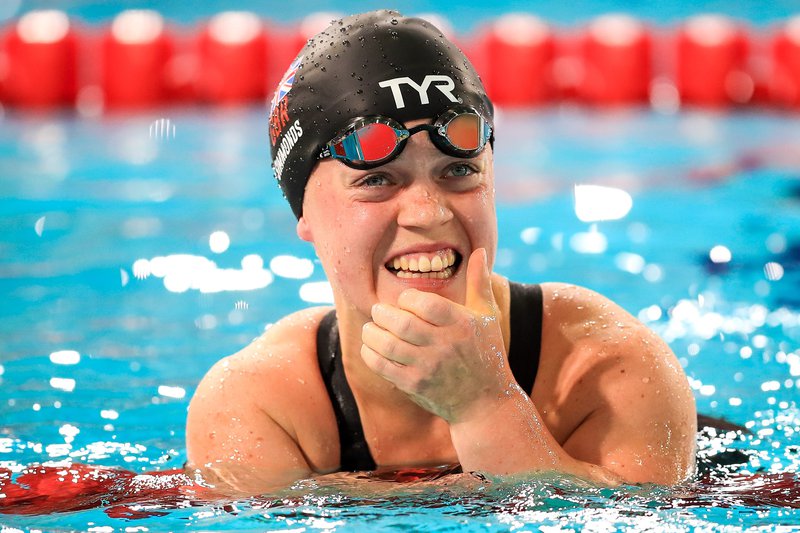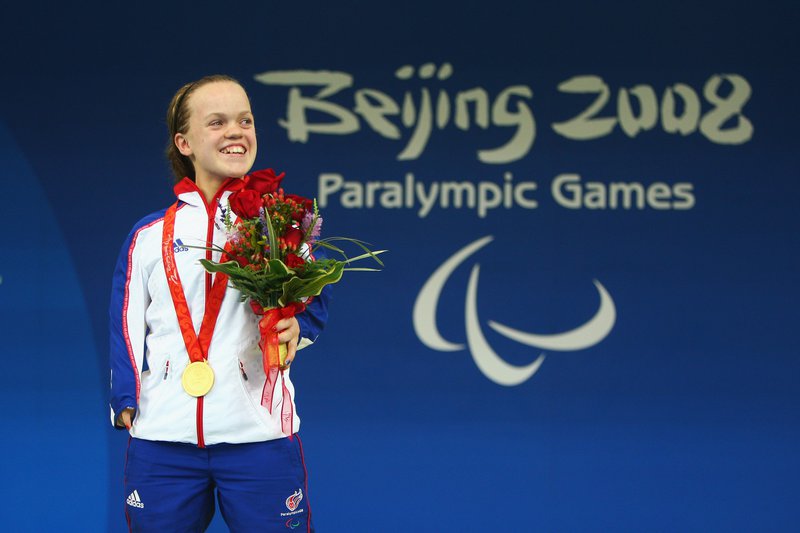As part of Mental Health Awareness week we caught up with Ellie Simmonds for a chat about why mental health is so important, plus how she copes with the pressures of sport, life and lockdown.
As quite possibly the most famous British Para-Swimmer of all time, it can be easy to look at an athlete of Ellie Simmonds' calibre and see a life that glitters only in those golden moments in the public eye. But beyond the physical rigours of making it to the top of the sport, we caught up with the five time Paralympic champion to discuss why mental health is such an important aspect of success.
"Mental
health, for me, is such a huge thing as an athlete and also as an
individual - as a person your mental health is one of the key aspects of life
really. As an athlete I think your mental health is so important in getting you
in the right frame of mind, for competition and for training – you can
physically be the best athlete or be in the best shape, but mentally if you’re
not on the game then it’s all up in the air. I
know that when I’m mentally strong, when I’m mentally ok that I’m unstoppable, but mentally when I
feel low, when I feel drained it’s hard.
"Some days you struggle even if physically you feel great, so I think mental health is so important and I’m so glad everyone at the moment is talking about it a lot in the media and in sport and in the workplace."
And in what ways does the 25 year old practically look after her mental wellbeing?
"For me I’m very lucky that I’m super aware of my mentality and my mental health. One of the key aspects that I do to keep myself mentally ok is that I talk to people. I’m very lucky that my coach, Billy Pye is like a best friend - we have that relationship where we talk about everything and anything. Some sessions we just sit on poolside and we talk things through, it might not be swimming it might be everyday life, but what’s on my mind I talk to him about it. Also my dad and my best best friends, they are always at the end of the phone no matter what, whether I’m struggling or even if I’m hyper and I’m doing well that I can just talk and soundboard off them.
"I’m very much into the likes of yoga, mindfulness and affirmations. When I wake up and I know that I’m struggling, I always try and say to myself, write down three things that I’m grateful for each day; it could be something little like grinding some beans and enjoying a cup of coffee, it could be that the weather’s really nice, it could be a nice text I get or a nice comment – something so simple but really to take a step back into how you’re feeling and to be grateful and to realise, 'yeah sometimes you’ve got these stresses, you’ve got these deadlines, you’ve got these competitions, you’ve got the pressure of the world on you but actually sometimes it’s about you’re human as well' and to realise there’s little things to be grateful for keeps you going."
Throughout the COVID-19 pandemic the British Para-Swimming team have been offering additional support to keep the team connected online, with Simmonds thankful for the flexibility of the offering.
"It’s been great to have these mindfulness, yoga and pilates session, which we can go into whenever we want and whenever we need. They’re not compulsory and I think that's really important as everyone copes with these types of things differently. During this time of isolation that’s happening at the moment, our mental wellbeing is key, so it’s great that British Para-Swimming are giving these sessions freely to anyone and just checking in."

With regular routines shaken during the period of lockdown that has spanned Great Britain, it has been an opportunity for reflection and a chance to recharge the batteries for an athlete who made her Paralympic debut in 2008 aged just 13.
"For me I think it’s been a great time for me in this current isolation period, I’ve been really truly able to think things through and realise how I love swimming. Whenever I do retire in the future, I’ll always like swimming and I’ll always love it. For me it’s a sport that’s brought so much joy, it’s brought me the best teammates in the world, and memories that I’ll never ever forget.
"Physically I love being able to push my body to the limits - that joy of being able to push your body, it’s nice, and being able to be in good shape and able to do exercise, but mentally for me swimming in the mornings is a de-stressor, it’s nice to be in your own mind. And sport, swimming or any sport, it gives you a high afterwards. Yeah, sometimes your motivation is low and you can’t be bothered to swim, but then once you’re doing it and afterwards you feel so good because you feel accomplished. So swimming is both a sport mentally and physically - I could talk about it positively all day - it is so good!
"At the moment though I’m really actually enjoying being able to be normal for a bit; I know that it’s crazy to say but it’s been really nice. I’m going through a lot of stuff from all my boxes from like my first World Championships in 2006 to Beijing, London, Rio and all those bits of memorabilia and having a bit of a clear out. This chance now to catch up with family and not think about where I’ve got to be at a certain time, it’s actually really invigorating and helping me so much, and it’s been really nice to switch off and step away from the pressures of sport and everyday life.
"I’m very lucky in that in normal times when I'm training in London, I can be an athlete but be an adult as well, going to coffee shops, go for walks, be with friends and just do normal things like shopping. It’s important to go to the pool, I’m a swimmer, I’m a professional athlete but then to be able to step away and change that when I’m outside the pool - that is really important."

To finish up we asked Ellie about about the key principles she's put in place to maintain balance during this period and any advice for those struggling with the lockdown.
"I’m still setting my alarm for early, 7am as I’m a morning person, so I do my sport and exercise workouts in the morning. I could easily just wake up and think ‘oh I don’t want to do anything, I could just sleep or watch Netflix and do nothing all day’ but I think it’s really important to set yourself an alarm and try and keep some normality as much as possible.
"My advice would be to be proactive, and I know that’s hard to say when you’re in a struggling situation, but to write down things that you want to achieve in the day and things you look forward to in the future. Your mental state at the moment is a priority though, so don’t go beating yourself up if you don’t finish everything. Realise and take in all the little things and enjoy the stuff that when we go back to normality it's going to be harder to do because our times pulled in other directions."
Monday 18 May to Sunday 24 May is Mental Health Awareness Week, with the theme for 2020 being ‘kindness’. You can find out more information here.

